
This page covers gambling to raise money for charity in California.
California has three statutes that authorize and regulate various aspects of charitable gaming.
California Penal Code Section 320.5, adopted pursuant to a constitutional amendment approved by voters in 2000, permits qualified charities to conduct raffles. The text of that law is as follows:
320.5.
(a) Nothing in this chapter applies to any raffle conducted by an eligible organization as defined in subdivision (c) for the purpose of directly supporting beneficial or charitable purposes or financially supporting another private, nonprofit, eligible organization that performs beneficial or charitable purposes if the raffle is conducted in accordance with this section.
(b) For purposes of this section, “raffle” means a scheme for the distribution of prizes by chance among persons who have paid money for paper tickets that provide the opportunity to win these prizes, where all of the following are true:
(1) Each ticket is sold with a detachable coupon or stub, and both the ticket and its associated coupon or stub are marked with a unique and matching identifier.
(2) Winners of the prizes are determined by draw from among the coupons or stubs described in paragraph (1) that have been detached from all tickets sold for entry in the draw.
(3) The draw is conducted in California under the supervision of a natural person who is 18 years of age or older.
(4) (A) At least 90 percent of the gross receipts generated from the sale of raffle tickets for any given draw are used by the eligible organization conducting the raffle to benefit or provide support for beneficial or charitable purposes, or it may use those revenues to benefit another private, nonprofit organization, provided that an organization receiving these funds is itself an eligible organization as defined in subdivision (c). As used in this section, “beneficial purposes” excludes purposes that are intended to benefit officers, directors, or members, as defined by Section 5056 of the Corporations Code, of the eligible organization. In no event shall funds raised by raffles conducted pursuant to this section be used to fund any beneficial, charitable, or other purpose outside of California. This section does not preclude an eligible organization from using funds from sources other than the sale of raffle tickets to pay for the administration or other costs of conducting a raffle.
(B) An employee of an eligible organization who is a direct seller of raffle tickets shall not be treated as an employee for purposes of workers’ compensation under Section 3351 of the Labor Code if the following conditions are satisfied:
(i) Substantially all of the remuneration (whether or not paid in cash) for the performance of the service of selling raffle tickets is directly related to sales rather than to the number of hours worked.
(ii) The services performed by the person are performed pursuant to a written contract between the seller and the eligible organization and the contract provides that the person will not be treated as an employee with respect to the selling of raffle tickets for workers’ compensation purposes.
(C) For purposes of this section, employees selling raffle tickets shall be deemed to be direct sellers as described in Section 650 of the Unemployment Insurance Code as long as they meet the requirements of that section.
(c) For purposes of this section, “eligible organization” means a private, nonprofit organization that has been qualified to conduct business in California for at least one year prior to conducting a raffle and is exempt from taxation pursuant to Sections 23701a, 23701b, 23701d, 23701e, 23701f, 23701g, 23701k, 23701l, 23701t, or 23701w of the Revenue and Taxation Code.
(d) Any person who receives compensation in connection with the operation of the raffle shall be an employee of the eligible organization that is conducting the raffle, and in no event may compensation be paid from revenues required to be dedicated to beneficial or charitable purposes.
(e) No raffle otherwise permitted under this section may be conducted by means of, or otherwise utilize, any gaming machine, apparatus, or device, whether or not that machine, apparatus, or device meets the definition of slot machine contained in Section 330a, 330b, or 330.1.
(f) (1) No raffle otherwise permitted under this section may be conducted, nor may tickets for a raffle be sold, within an operating satellite wagering facility or racetrack inclosure licensed pursuant to the Horse Racing Law (Chapter 4 (commencing with Section 19400) of Division 8 of the Business and Professions Code) or within a gambling establishment licensed pursuant to the Gambling Control Act (Chapter 5 (commencing with Section 19800) of Division 8 of the Business and Professions Code).
(2) A raffle may not be operated or conducted in any manner over the Internet, nor may raffle tickets be sold, traded, or redeemed over the Internet. For purposes of this paragraph, an eligible organization shall not be deemed to operate or conduct a raffle over the Internet, or sell raffle tickets over the Internet, if the eligible organization advertises its raffle on the Internet or permits others to do so. Information that may be conveyed on an Internet Web site pursuant to this paragraph includes, but is not limited to, all of the following:
(A) Lists, descriptions, photographs, or videos of the raffle prizes.
(B) Lists of the prize winners.
(C) The rules of the raffle.
(D) Frequently asked questions and their answers.
(E) Raffle entry forms, which may be downloaded from the Internet Web site for manual completion by raffle ticket purchasers, but shall not be submitted to the eligible organization through the Internet.
(F) Raffle contact information, including the eligible organization’s name, address, telephone number, facsimile number, or e-mail address.
(g) No individual, corporation, partnership, or other legal entity shall hold a financial interest in the conduct of a raffle, except the eligible organization that is itself authorized to conduct that raffle, and any private, nonprofit, eligible organizations receiving financial support from that charitable organization pursuant to subdivisions (a) and (b).
(h) (1) An eligible organization may not conduct a raffle authorized under this section, unless it registers annually with the Department of Justice. The department shall furnish a registration form via the Internet or upon request to eligible nonprofit organizations. The department shall, by regulation, collect only the information necessary to carry out the provisions of this section on this form. This information shall include, but is not limited to, the following:
(A) The name and address of the eligible organization.
(B) The federal tax identification number, the corporate number issued by the Secretary of State, the organization number issued by the Franchise Tax Board, or the California charitable trust identification number of the eligible organization.
(C) The name and title of a responsible fiduciary of the organization.
(2) The department may require an eligible organization to pay an annual registration fee of ten dollars ($10) to cover the actual costs of the department to administer and enforce this section. The department may, by regulation, adjust the annual registration fee as needed to ensure that revenues willfully offset, but do not exceed, the actual costs incurred by the department pursuant to this section.
The fee shall be deposited by the department into the General Fund.
(3) The department shall receive General Fund moneys for the costs incurred pursuant to this section subject to an appropriation by the Legislature.
(4) The department shall adopt regulations necessary to effectuate this section, including emergency regulations, pursuant to the Administrative Procedure Act (Chapter 3.5 (commencing with Section
11340) of Part 1 of Division 3 of Title 2 of the Government Code).
(5) The department shall maintain an automated database of all registrants. Each local law enforcement agency shall notify the department of any arrests or investigation that may result in an administrative or criminal action against a registrant. The department may audit the records and other documents of a registrant to ensure compliance with this section.
(6) Once registered, an eligible organization must file annually thereafter with the department a report that includes the following:
(A) The aggregate gross receipts from the operation of raffles.
(B) The aggregate direct costs incurred by the eligible organization from the operation of raffles.
(C) The charitable or beneficial purposes for which proceeds of the raffles were used, or identify the eligible recipient organization to which proceeds were directed, and the amount of those proceeds.
(7) The department shall annually furnish to registrants a form to collect this information.
(8) The registration and reporting provisions of this section do not apply to any religious corporation sole or other religious corporation or organization that holds property for religious purposes, to a cemetery corporation regulated under Chapter 19 of Division 3 of the Business and Professions Code, or to any committee as defined in Section 82013 that is required to and does file any statement pursuant to the provisions of Article 2 (commencing with Section 84200) of Chapter 4 of Title 9, or to a charitable corporation organized and operated primarily as a religious organization, educational institution, hospital, or a health care service plan licensed pursuant to Section 1349 of the Health and Safety Code.
(i) The department may take legal action against a registrant if it determines that the registrant has violated this section or any regulation adopted pursuant to this section, or that the registrant has engaged in any conduct that is not in the best interests of the public’s health, safety, or general welfare. Any action taken pursuant to this subdivision does not prohibit the commencement of an administrative or criminal action by the Attorney General, a district attorney, city attorney, or county counsel.
(j) Each action and hearing conducted to deny, revoke, or suspend a registry, or other administrative action taken against a registrant shall be conducted pursuant to the Administrative Procedure Act (Chapters 4.5 (commencing with Section 11400) and 5 (commencing with Section 11500) of Part 1 of Division 3 of Title 2 of the Government Code). The department may seek recovery of the costs incurred in investigating or prosecuting an action against a registrant or applicant in accordance with those procedures specified in Section
125.3 of the Business and Professions Code. A proceeding conducted under this subdivision is subject to judicial review pursuant to Section 1094.5 of the Code of Civil Procedure.
(k) The Department of Justice shall conduct a study and report to the Legislature by December 31, 2003, on the impact of this section on raffle practices in California. Specifically, the study shall include, but not be limited to, information on whether the number of raffles has increased, the amount of money raised through raffles and whether this amount has increased, whether there are consumer complaints, and whether there is increased fraud in the operation of raffles.
(l) This section shall become operative on July 1, 2001.
(m) A raffle shall be exempt from this section if it satisfies all of the following requirements:
(1) It involves a general and indiscriminate distribution of the tickets.
(2) The tickets are offered on the same terms and conditions as the tickets for which a donation is given.
(3) The scheme does not require any of the participants to pay for a chance to win.
326.5.
(a) Neither the prohibition on gambling in this chapter nor in Chapter 10 (commencing with Section 330) applies to any bingo game that is conducted in a city, county, or city and county pursuant to an ordinance enacted under Section 19 of Article IV of the State Constitution, if the ordinance allows games to be conducted only in accordance with this section and only by organizations exempted from the payment of the bank and corporation tax by Sections 23701a, 23701b, 23701d, 23701e, 23701f, 23701g, 23701k, 23701w, and 23701l of the Revenue and Taxation Code and by mobilehome park associations, senior citizens organizations, and charitable organizations affiliated with a school district; and if the receipts of those games are used only for charitable purposes.
(b) It is a misdemeanor for any person to receive or pay a profit, wage, or salary from any bingo game authorized by Section 19 of Article IV of the State Constitution. Security personnel employed by the organization conducting the bingo game may be paid from the revenues of bingo games, as provided in subdivisions (j) and (k).
(c) A violation of subdivision (b) shall be punishable by a fine not to exceed ten thousand dollars ($10,000), which fine is deposited in the general fund of the city, county, or city and county that enacted the ordinance authorizing the bingo game. A violation of any provision of this section, other than subdivision (b), is a misdemeanor.
(d) The city, county, or city and county that enacted the ordinance authorizing the bingo game may bring an action to enjoin a violation of this section.
(e) No minors shall be allowed to participate in any bingo game.
(f) An organization authorized to conduct bingo games pursuant to subdivision (a) shall conduct a bingo game only on property owned or leased by it, or property whose use is donated to the organization, and which property is used by that organization for an office or for performance of the purposes for which the organization is organized. Nothing in this subdivision shall be construed to require that the property owned or leased by, or whose use is donated to, the organization be used or leased exclusively by, or donated exclusively to, that organization.
(g) All bingo games shall be open to the public, not just to the members of the authorized organization.
(h) A bingo game shall be operated and staffed only by members of the authorized organization that organized it. Those members shall not receive a profit, wage, or salary from any bingo game. Only the organization authorized to conduct a bingo game shall operate such a game, or participate in the promotion, supervision, or any other phase of a bingo game. This subdivision does not preclude the employment of security personnel who are not members of the authorized organization at a bingo game by the organization conducting the game.
(i) No individual, corporation, partnership, or other legal entity, except the organization authorized to conduct a bingo game, shall hold a financial interest in the conduct of a bingo game.
(j) With respect to organizations exempt from payment of the bank and corporation tax by Section 23701d of the Revenue and Taxation Code, all profits derived from a bingo game shall be kept in a special fund or account and shall not be commingled with any other fund or account. Those profits shall be used only for charitable purposes.
(k) With respect to other organizations authorized to conduct bingo games pursuant to this section, all proceeds derived from a bingo game shall be kept in a special fund or account and shall not be commingled with any other fund or account. Proceeds are the receipts of bingo games conducted by organizations not within subdivision (j). Those proceeds shall be used only for charitable purposes, except as follows:
(1) The proceeds may be used for prizes.
(2) (A) Except as provided in subparagraph (B), a portion of the proceeds, not to exceed 20 percent of the proceeds before the deduction for prizes, or two thousand dollars ($2,000) per month, whichever is less, may be used for the rental of property and for overhead, including the purchase of bingo equipment, administrative expenses, security equipment, and security personnel.
(B) For the purposes of bingo games conducted by the Lake Elsinore Elks Lodge, a portion of the proceeds, not to exceed 20 percent of the proceeds before the deduction for prizes, or three thousand dollars ($3,000) per month, whichever is less, may be used for the rental of property and for overhead, including the purchase of bingo equipment, administrative expenses, security equipment, and security personnel. Any amount of the proceeds that is additional to that permitted under subparagraph (A), up to one thousand dollars ($1,000), shall be used for the purpose of financing the rebuilding of the facility and the replacement of equipment that was destroyed by fire in 2007. The exception to subparagraph (A) that is provided by this subparagraph shall remain in effect only until the cost of rebuilding the facility is repaid, or January 1, 2019, whichever occurs first.
(3) The proceeds may be used to pay license fees.
(4) A city, county, or city and county that enacts an ordinance permitting bingo games may specify in the ordinance that if the monthly gross receipts from bingo games of an organization within this subdivision exceed five thousand dollars ($5,000), a minimum percentage of the proceeds shall be used only for charitable purposes not relating to the conducting of bingo games and that the balance shall be used for prizes, rental of property, overhead, administrative expenses, and payment of license fees. The amount of proceeds used for rental of property, overhead, and administrative expenses is subject to the limitations specified in paragraph (2).
(l) (1) A city, county, or city and county may impose a license fee on each organization that it authorizes to conduct bingo games.
The fee, whether for the initial license or renewal, shall not exceed fifty dollars ($50) annually, except as provided in paragraph (2).
If an application for a license is denied, one-half of any license fee paid shall be refunded to the organization.
(2) In lieu of the license fee permitted under paragraph (1), a city, county, or city and county may impose a license fee of fifty dollars ($50) paid upon application. If an application for a license is denied, one-half of the application fee shall be refunded to the organization. An additional fee for law enforcement and public safety costs incurred by the city, county, or city and county that are directly related to bingo activities may be imposed and shall be collected monthly by the city, county, or city and county issuing the license; however, the fee shall not exceed the actual costs incurred in providing the service.
(m) No person shall be allowed to participate in a bingo game, unless the person is physically present at the time and place where the bingo game is being conducted.
(n) The total value of prizes available to be awarded during the conduct of any bingo games shall not exceed five hundred dollars ($500) in cash or kind, or both, for each separate game which is held.
(o) As used in this section, “bingo” means a game of chance in which prizes are awarded on the basis of designated numbers or symbols that are marked or covered by the player on a tangible card in the player’s possession and that conform to numbers or symbols, selected at random and announced by a live caller. Notwithstanding Section 330c, as used in this section, the game of bingo includes tangible cards having numbers or symbols that are concealed and preprinted in a manner providing for distribution of prizes.
Electronics or video displays shall not be used in connection with the game of bingo, except in connection with the caller’s drawing of numbers or symbols and the public display of that drawing, and except as provided in subdivision (p). The winning cards shall not be known prior to the game by any person participating in the playing or operation of the bingo game. All preprinted cards shall bear the legend, “for sale or use only in a bingo game authorized under California law and pursuant to local ordinance.” Only a covered or marked tangible card possessed by a player and presented to an attendant may be used to claim a prize. It is the intention of the Legislature that bingo as defined in this subdivision applies exclusively to this section and shall not be applied in the construction or enforcement of any other provision of law.
(p) (1) Players who are physically present at a bingo game may use hand-held, portable card-minding devices, as described in this subdivision, to assist in monitoring the numbers or symbols announced by a live caller as those numbers or symbols are called in a live game. Card-minding devices may not be used in connection with any game where a bingo card may be sold or distributed after the start of the ball draw for that game. A card-minding device shall do all of the following:
(A) Be capable of storing in the memory of the device bingo faces of tangible cards purchased by a player.
(B) Provide a means for bingo players to input manually each individual number or symbol announced by a live caller.
(C) Compare the numbers or symbols entered by the player to the bingo faces previously stored in the memory of the device.
(D) Identify winning bingo patterns that exist on the stored bingo faces.
(2) A card-minding device shall perform no functions involving the play of the game other than those described in paragraph (1).
Card-minding devices shall not do any of the following:
(A) Be capable of accepting or dispensing any coins, currency, or other representative of value or on which value has been encoded.
(B) Be capable of monitoring any bingo card face other than the faces of the tangible bingo card or cards purchased by the player for that game.
(C) Display or represent the game result through any means, including, but not limited to, video or mechanical reels or other slot machine or casino game themes, other than highlighting the winning numbers or symbols marked or covered on the tangible bingo cards or giving an audio alert that the player’s card has a prize-winning pattern.
(D) Determine the outcome of any game or be physically or electronically connected to any component that determines the outcome of a game or to any other bingo equipment, including, but not limited to, the ball call station, or to any other card-minding device. No other player-operated or player-activated electronic or electromechanical device or equipment is permitted to be used in connection with a bingo game.
(3) (A) A card-minding device shall be approved in advance by the commission as meeting the requirements of this section and any additional requirements stated in regulations adopted by the commission. Any proposed material change to the device, including any change to the software used by the device, shall be submitted to the commission and approved by the commission prior to implementation.
(B) In accordance with Chapter 5 (commencing with Section 19800) of Division 8 of the Business and Professions Code, the commission shall establish reasonable criteria for, and require the licensure of, any person that directly or indirectly manufactures, distributes, supplies, vends, leases, or otherwise provides card-minding devices or other supplies, equipment, or services related to card-minding devices designed for use in the playing of bingo games by any nonprofit organization.
(C) A person or entity that supplies or services any card-minding device shall meet all licensing requirements established by the commission in regulations.
(4) The costs of any testing, certification, license, or determination required by this subdivision shall be borne by the person or entity seeking it.
(5) On and after January 1, 2010, the commission and the Department of Justice may inspect all card-minding devices at any time without notice, and may immediately prohibit the use of any device that does not comply with the requirements of subdivision (r) of Section 19841 of the Business and Professions Code. The Department of Justice may at any time, without notice, impound any device the use of which has been prohibited by the commission.
(6) The California Gambling Control Commission shall issue regulations to implement the requirements of this subdivision and may issue regulations regarding the means by which the operator of a bingo game, as required by applicable law, may offer assistance to a player with disabilities in order to enable that player to participate in a bingo game, provided that the means of providing that assistance shall not be through any electronic, electromechanical, or other device or equipment that accepts the insertion of any coin, currency, token, credit card, or other means of transmitting value, and does not constitute or is not a part of a system that constitutes a video lottery terminal, slot machine, or device prohibited by Chapter 10 (commencing with Section 330).
(7) The following definitions apply for purposes of this subdivision:
(A) “Commission” means the California Gambling Control Commission.
(B) “Person” includes a natural person, corporation, limited liability company, partnership, trust, joint venture, association, or any other business organization.
19987. (a) The department, by regulation or order, may require any person or entity set forth in subdivision (b), to register with the department.
(b) “Person or entity” means one who, directly or indirectly, manufactures, distributes, supplies, vends, leases, or otherwise provides, supplies, devices, or other equipment designed for use in the playing of controlled games by any nonprofit organization registered to conduct controlled games.
Bona fide charities in existence for at least three years may now hold poker tournaments under a new law that became effective January 1, 2007. This new law, California Business & Professions Code Section 19985 through 19987, allows charities to conduct “controlled games” nights once a year. “Controlled game” is defined in California Penal Code Section 337j(e), and means “any poker or Pai Gow game, and any other game played with cards or tiles, or both, and approved by the Division of Gambling Control, and any game of chance, including any gambling device, played for currency, check, credit, or any other thing of value that is not prohibited and made unlawful by statute or local ordinance.”
The California Department of Justice, Division of Gambling Control website is here. Also, a primer on charitable gaming in California published by the Division is here.
The text of the new law is as follows:
SECTION 1. Article 17 (commencing with Section 19985) is added to Chapter 5 of Division 8 of the Business and Professions Code, to read:
Article 17. Nonprofit Organization Fundraisers
19985. The Legislature finds and declares the following:
(a) Nonprofit organizations provide important and necessary services to the people of the State of California with respect to educational and social services and there is a need to provide methods of fundraising to nonprofit organizations so as to enable them to meet their stated purposes.
(b) The playing of controlled games for the purpose of raising funds by nonprofit organizations is in the public interest.
(c) Uniform regulation for the conduct of controlled games is in the best interests of nonprofit organizations and the people of this state.
19986.
(a) Notwithstanding any other provision of state law a nonprofit organization may conduct a fundraiser using controlled games as a funding mechanism to further the purposes and mission of the nonprofit organization.
(b) A nonprofit organization holding a fundraiser pursuant to subdivision (a) shall not conduct more than one fundraiser per calendar year, and each fundraiser shall not exceed five consecutive hours. Each fundraiser shall be preapproved by the Division of Gambling Control. Eligible nonprofit organizations that have multiple chapters may hold one fundraiser per chapter per calendar year.
(c) No cash prizes or wagers may be awarded to participants, however, the winner of each controlled game may be entitled to a prize from those donated to the fundraiser. An individual prize awarded to each winner shall not exceed a cash value of five hundred dollars ($500). For each event, the total cash value of prizes awarded shall not exceed five thousand dollars ($5,000).
(d) At least 90 percent of the gross revenue from the fundraiser shall go directly to a nonprofit organization. Compensation shall not be paid from revenues required to go directly to the nonprofit organization for the benefit of which the fundraiser is conducted, and no more than 10 percent of the gross receipts of a fundraiser may be paid as compensation to the
entity or persons conducting the fundraiser for the nonprofit organization. If an eligible nonprofit organization does not own a facility in which to conduct a fundraiser and is required to pay the entity or person conducting the fundraiser a rental fee for the facility, the fair market rental value of the facility shall not be included when determining the compensation payable to the entity or person for purposes of this section. This section does not preclude an eligible organization from using funds from sources other than the gross revenue of the fundraiser to pay for the administration or other costs of conducting the fundraiser.
(e) An eligible nonprofit organization shall not conduct a fundraiser authorized by this section, unless it has been in existence and operation for at least three years and registers annually with the Division of Gambling Control. The division shall furnish a registration form on its Internet Web site or, upon request, to eligible nonprofit organizations. The division shall, by regulation, collect only the information necessary pursuant to this section on this form. This information shall include, but is not limited to, the following:
(1) The name and address of the eligible organization.
(2) The federal tax identification number, the corporate number issued by the Secretary of State, the organization number issued by the Franchise Tax Board, or the California charitable trust identification number of the eligible organization.
(3) The name and title of a responsible fiduciary of the organization.
(f) The division shall adopt regulations necessary to effectuate this section, including emergency regulations, pursuant to the Administrative Procedure Act (Chapter 3.5 (commencing with Section 11340) of Part 1 of Division 3 of Title 2 of the Government Code).
(g) The nonprofit organization shall maintain records for each fundraiser using controlled games, which shall include:
(1) An itemized list of gross receipts for the fundraiser.
(2) An itemized list of recipients of the net profit of the fundraiser, including the name, address, and purpose for which fundraiser proceeds are to be used.
(3) The number of persons who participated in the fundraiser.
(4) An itemized list of the direct cost incurred for each fundraiser.
(5) A list of all prizes awarded during each fundraiser.
(6) The date, hours, and location for each fundraiser held.
(h) As used in this article, “nonprofit organization ” means an organization that has been qualified to conduct business in California for at least three years prior to conducting controlled games and is exempt from taxation pursuant to Section 23701a, 23701b, 23701d, 23701e, 23701f, 23701g, 23701k, 23701l, or 23701w of the Revenue and Taxation Code.
(i) The division may take legal action against a registrant if it determines that the registrant has violated this section or any regulation adopted pursuant to this section, or that the registrant has engaged in any conduct that is not in the best interest of the public’s health, safety, or general welfare. Any action taken pursuant to this subdivision does not prohibit the commencement of an administrative or criminal action by the Attorney General, a district attorney, or county counsel.
(j) The division may require an eligible organization to pay an annual registration fee of up to one hundred dollars ($100) per year to cover the actual costs of the division to administer and enforce this section. The annual registration fees shall be deposited by the division into the Gambling Control Fund.
(k) No fundraiser permitted under this section may be conducted by means of, or otherwise utilize, any gaming machine, apparatus, or device that meets the definition of a slot machine contained in Section 330b or
330.1 of the Penal Code.
(l) No more than four fundraisers at the same location, even if sponsored by different nonprofit organizations, shall be permitted in any calendar year, except in rural areas where preapproved by the Division of Gambling Control. For purposes of this section, “rural” shall mean any county with an urban influence code, as established by the latest publication of the Economic Research Service of the United States Department of Agriculture, of “3” or more.
(m) The authority to conduct a fundraiser, as well as the type of controlled games, may be governed by local ordinance.
(n) No person shall be permitted to participate in the fundraiser unless that person is at least 21 years of age.
(o) No fundraiser permitted under this section may be operated or conducted over the Internet.
19987.
(a) The department, by regulation or order, may require any person or entity set forth in subdivision (b), to register with the department.
(b) “Person or entity” means one who, directly or indirectly, manufactures, distributes, supplies, vends, leases, or otherwise provides, supplies, devices, or other equipment designed for use in the playing of controlled games by any nonprofit organization registered to conduct controlled games.
Related pages: California Gambling Laws / California Online Gambling for Real Money
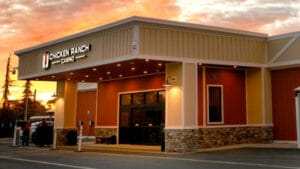
The Attorney General of California has this week agreed with a February ruling that allows five California Tribes to negotiate gaming compacts directly with the U.S. government instead of with […]
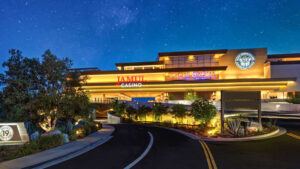
For more than two decades, Jamul Casino, formerly Hollywood Casino Jamul and located near San Diego, has faced several lawsuits a year. Local and former residents have sent more than […]

A controversial campaign to legalize sports betting in California through a ballot initiative in 2024 involving offshore sportsbooks and California Tribes has ended this week. Kasey Thompson, the main proponent […]
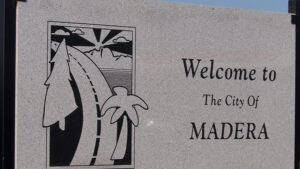
More than two decades in the making, the North Fork Rancheria of Mono Indians is reaching the final pre-construction phase of its planned addition to the list of Tribal California […]

FanDuel has paid more than $71M to buy a plush luxury office space (pictured) in the prestigious neighborhood of Beverly Hills, California. That’s despite California sports betting remaining illegal for […]
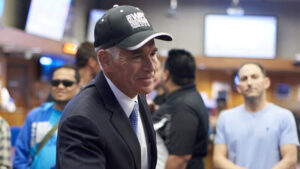
Kyle Kirkland (pictured) is the owner of Fresno’s Club One Casino cardroom and president of the California Gaming Association. This week, he announced he will be running to be California’s […]
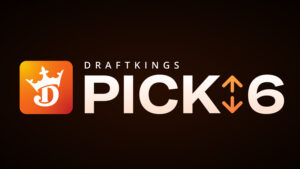
Leading U.S. sportsbook operator DraftKings has expanded its Pick6 Pick ‘Em daily fantasy sports game into two new states. It emerged on the same day regulators forced it to close […]

A landmark development began recently in Kern County, California, with the groundbreaking of the Hard Rock Hotel and Casino Tejon. This ambitious plan to add to the list of California […]
Are you ready to take your online gambling experience to the next level? Sign up for the LetsGambleUSA newsletter and get the latest news, exclusive offers, and expert tips delivered straight to your inbox.